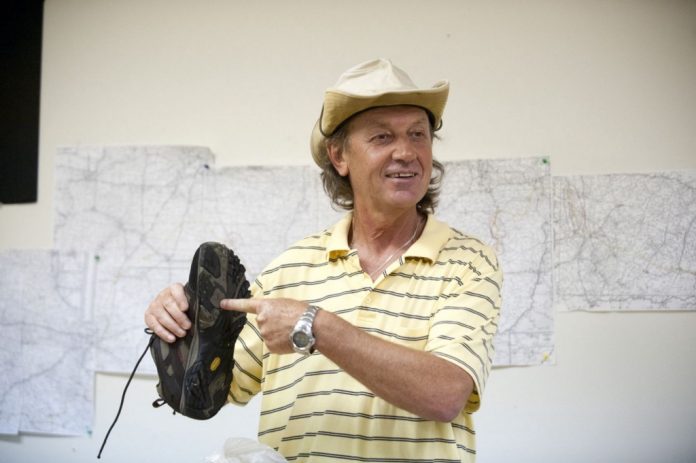Fishtown resident Peter Prusinowski shows off the original pair of shoes that he wore on his Trail of Hope walk across the country at the Penn Treaty Museum on Wednesday, Aug 17. Prusinowski recenlty completed a walk that traced the Lenape Indian migration from the Delaware Valley to Bartlesville, Oklahoma.
His name is Peter Prusinowski.
But you can call him “Ohelemuxwet.”
At least, that’s the name he’s been given by the Delaware Indians of Oklahoma after he recently completed a 2,000-mile, four-and-a-half-month journey from Fishtown to Bartlesville, Okla.
It means — what else? — “one who walks a long way.”
Prusinowski’s journey began on March 23, and it was a difficult long-distance trudge through thunderstorms, 116-degree heat and even a snow storm.
“Sometimes, the temperature was over 116 degrees, and that was in the shade,” Prusinowski, a photographer, said a week and a half ago, just his second day back in Philly after his trip.
For more than a decade, Prusinowski has studied the culture of Native Americans. With the walking trip he called the “Trail of Hope,” Prusinowski followed the migration of the Lenni Lenape Indians from Penn Treaty Park, where they had made peace with William Penn, to their current tribal grounds in Oklahoma.
He was excited to photograph the country as he walked, and he even planned to videotape his entire trip, but soon after he began, the weight of all the equipment bogged him down and he saw little of interest to photograph.
“Photography-wise, it’s really boring,” he said.
Walking about 25 miles each day along local roads, Prusinowski carried a 30-pound backpack — about 60 percent of the weight was water he needed because of the relentless heat.
During the trip, he shipped his camcorder and a tripod back home to reduce some of the weight.
To get through the scorching heat he encountered in areas of Missouri and Kansas, Prusinowski would walk at night and sleep in the day, trying to find what shade he could, sometimes renting a cheap hotel room to get some rest.
“I stayed in some places where a lot of people would have said, ‘I’m not staying here,’” he said with a laugh, talking about the dirty and cheap motels he found.
In May, after a devastating tornado hit Joplin, Miss., Prusinowski walked to the town — three days out of his way — to volunteer with the cleanup effort. He stayed for eight days and met many residents who had lost everything in the natural disaster.
“Of all the houses that were damaged, none could be saved,” he said. “It was extremely hard to talk to some of them. Saying you were sorry, what does that mean? It means nothing. They were so hurt. But there were so many volunteers, and they were grateful for that.”
Along the way, Prusinowski said, he expected to run into historic markers or memorial sites where the Lenni Lenape had stayed during the 180 years the tribe moved across the country. ldquo;But I found nothing,” he said, noting that he had studied where the tribe had traveled, but, when he got there, he found nothing marking the sites to recall the history.
“I would stop and ask people what they knew about the Indians in these towns, but there was nothing,” he said. “If I said something about William Penn, they would know, but just very little.”
It was a surprise he said, that the locals seemed to know so little about the past of the area. But what surprised him more was the poverty he found in towns that once had thriving Main Streets.
By walking local roads, he found towns that people miss when they drive on interstate highways. These small places, he said, seemed to have little more than cornfields and ruined vacant buildings.
“I came across at least ten small towns that I couldn’t imagine that people lived there,” he said. “It was kind of a scary thing to see these towns that prospered at one point that were now disappearing. Along the way, I don’t think I saw five towns that you would call towns with stores and homes. People just don’t know about this country. We say we are so great in the United States, but at these towns, I didn’t see any of that. That’s what we don’t hear about on TV news.”
Even with the difficulties of the trip, Prusinowski found it an incredible experience. Much of the hardship, he said, was washed away when he was welcomed by tribal leaders in Oklahoma.
“It was a good experience,” he said. “It’s hard to say right now . . . my mind keeps going back to those memories. This wasn’t a two-week vacation where you go and come back right away. My mind is still not clear on a few things. I’m still kind of in shock.” ••
Reporter Hayden Mitman can be reached at 215–354–3124 or [email protected]





